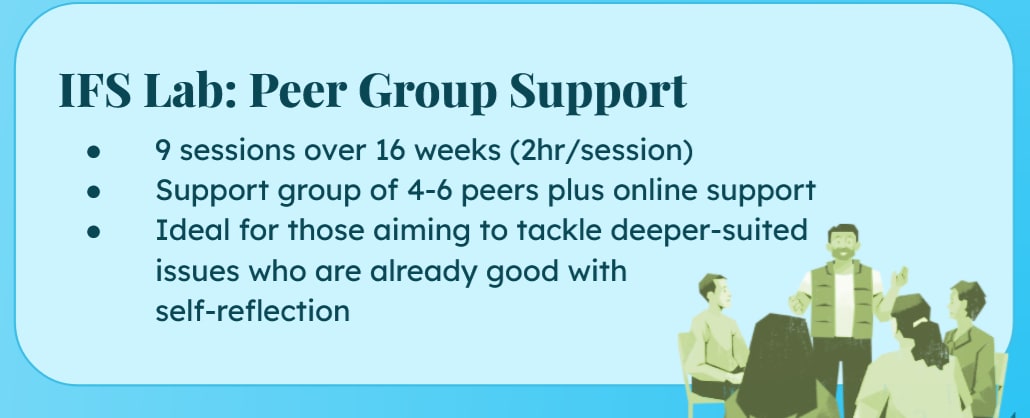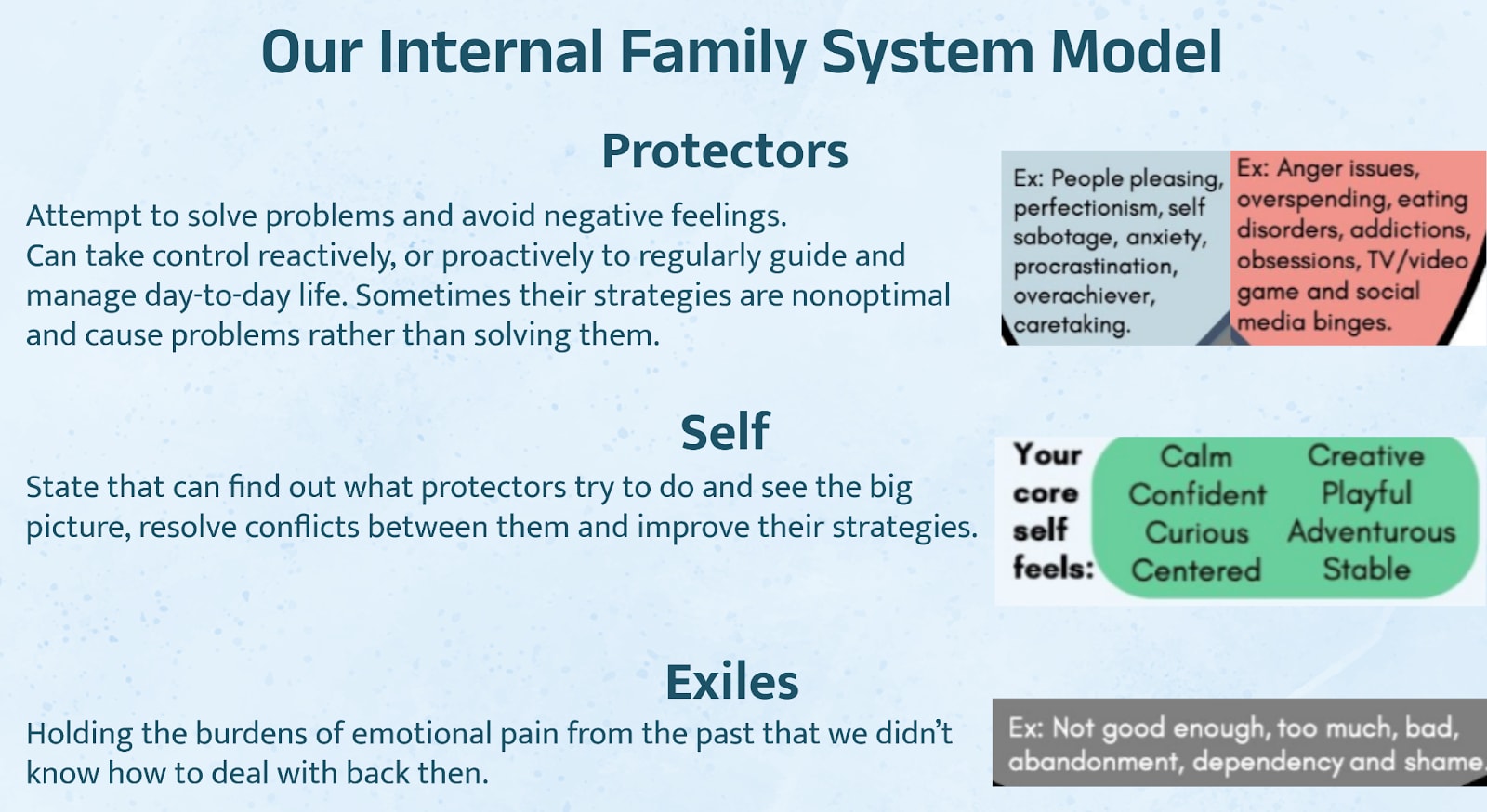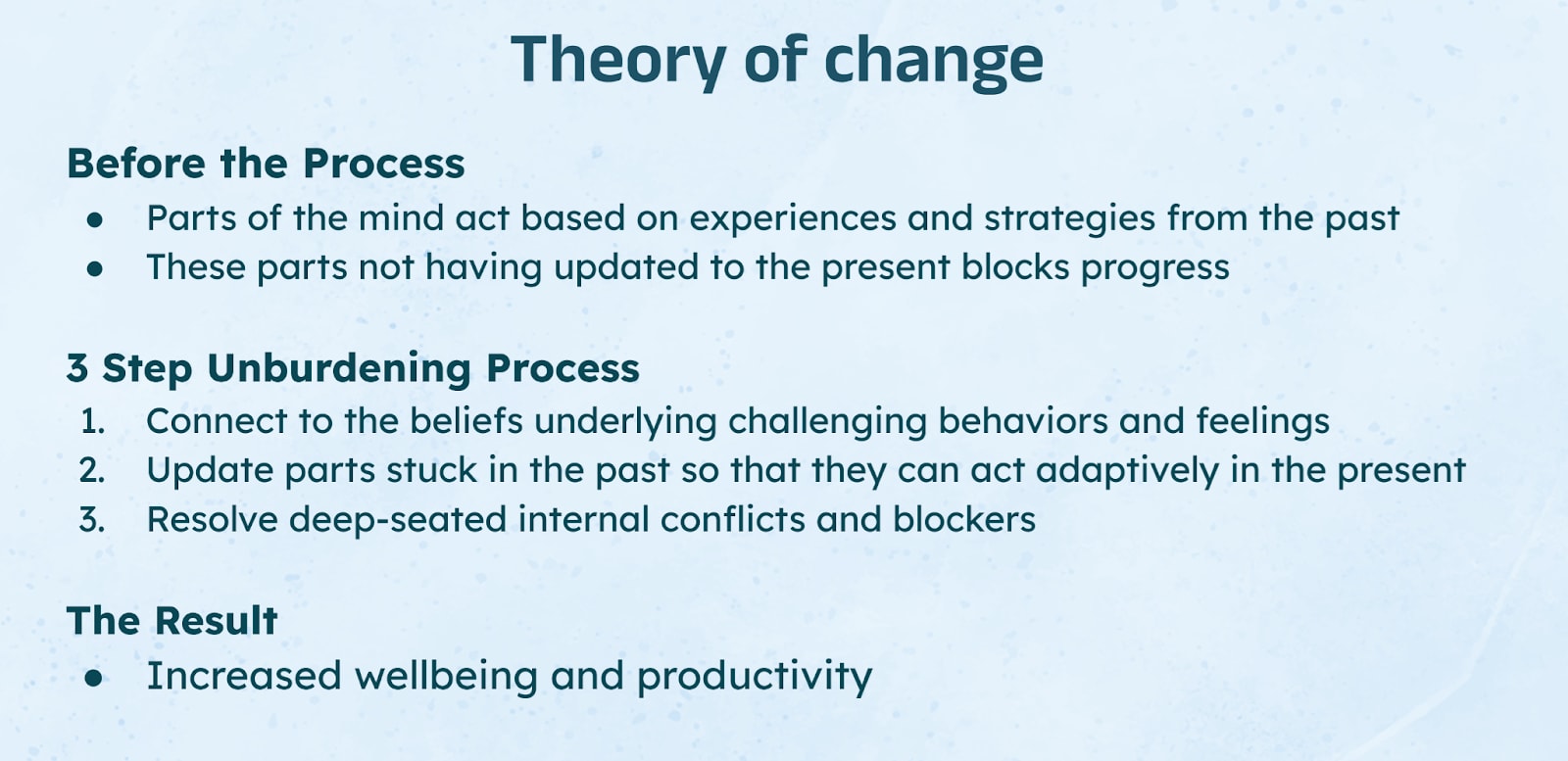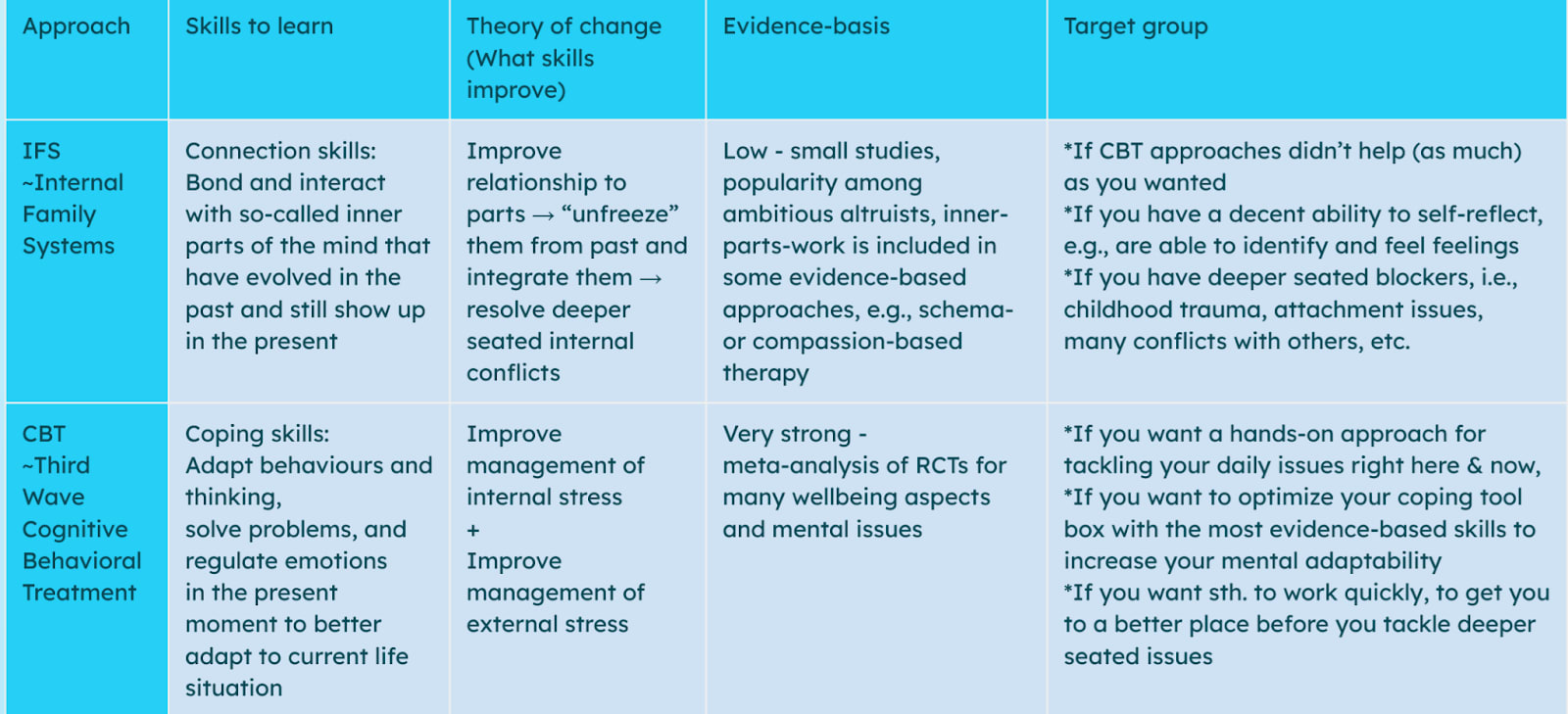Apply now: Get "unstuck" with the New IFS Self-Care Fellowship Program
By Inga, Kaj_Sotala, Dave Cortright 🔸, Tee @ 2024-07-15T13:02 (+44)
You finally want to resolve deeper-seated inner conflicts, and remove inner blocks in the way of becoming a more fulfilled, resilient, and well-performing version of yourself? This post allows you to learn how IFS as a coaching or therapy approach can help with mental wellbeing, if it might be the right approach for you, if so to get excited about it and inform you about the opportunity to take part in Rethink Wellbeing’s online IFS group course starting this August.
Executive Summary
Rethink Wellbeing’s (RW) launches a brand new online IFS course for ambitious altruists. Learn powerful, and practical tools to uncover the dynamics of your inner conflicts, become a more whole and resilient self, and transform your mental wellbeing and performance. You will meet with a peer group of 5-7 like-minded ambitious altruists led by a trained peer facilitator, for 6 weeks and 3 follow-ups. The course empowers you to learn IFS skills and apply those to your life until they become habitual. This includes 9 group sessions, home practice based on an IFS “playbook”, individual progress tracking, and support from the Rethink Wellbeing Online Community. Participation takes ~5 hours per week for 6 weeks, and 2-3 hours the 8 weeks after.
You can apply via the form now in less than 15 minutes.
Apply now- Due date: until 20th July 2024.
- All groups start in August 2024.
- We accept suitable participants until all spaces are full. The earlier you apply, the higher the chances to secure your spot.
No or low costs - two options and all in between:
- No costs and a motivational deposit of $200 (less in LMICs) that you get back upon successful participation, or
- $550 to cover the costs of your attendance.
Internal Family Systems (IFS): When talking about themselves, many people naturally use expressions like “a part of me.” For example, someone who was considering a job offer might say, “one part of me is excited about this opportunity, but another part of me is afraid of the responsibility.” Internal Family Systems (IFS) is a form of psychotherapy that takes this kind of language literally and assumes that people’s minds are divided into parts with sometimes conflicting beliefs and goals. IFS aims to reconcile conflicts between those parts and get them to cooperate rather than fight each other, so that they can become a more healed and whole self. The goal is to improve self-leadership, ground, and grow yourself, your new self, in the 8 C’s of IFS: curiosity, compassion, calmness, clarity, confidence, creativity, courage, and connectedness.

How IFS works
Do you know what would be beneficial for you to do, but just can’t make the change? Do you keep coming up against the same challenging or unresolvable inner blocks? Do you recognize these behaviors in yourself:
- Avoiding, putting off, and neglecting things:
- Are you procrastinating important tasks and goals, finding yourself endlessly planning but never executing?
- Do you find yourself turning to distractions or comfort activities when faced with stress?
- Feeling guilty for not doing what you planned to do? Or not good enough for not having done enough or good enough?
- Judging yourself, and high expectations:
- Are you constantly doubting your abilities despite your achievements? Feeling like an imposter in your field?
- Do you set excessively high standards for yourself that are almost impossible to meet?
- Or do you believe you need to keep doing more to be good enough?
- Monitoring yourself when with others:
- Do you try to make sure others think well of you by controlling what you do or don’t say?
- Do you keep trying to please others or take care of them so that they like you more or do what you want?
- Do you neglect your own needs and boundaries around others, or have a hard time accepting theirs? May you have attachment issues?
Do you finally want to change that? Consider attending our IFS online group program in August. You can apply now via this form within < 20 min to join. We check on a rolling basis and accept everyone we believe we can help.
Parts in the IFS Model
IFS is a therapeutic approach to “inner parts work”, i.e., working with how we might feel, think, and act divided about something. Those divisions within us that we can recognize repeatedly and that are so familiar that we could consider them as distinct 'selves' or 'parts' of ourselves. The graphic below shows the parts that the IFS model suggests for dividing the mind, with corresponding examples.
Theory of change
Ultimately, the goal of IFS is to facilitate communication and understanding among the parts described above (like a happy family!), leading to internal harmony and healing. The graphic below gives an overview of how working with inner parts in IFS aims to help clients improve their mental wellbeing.
Why Rethink Wellbeing chose IFS
Here’s why we chose to add IFS to our program versions on top of Third Wave CBT:
- Great IFS Pilot Group Results from RW in 2023:
- Of the pilot groups we ran, the “best” results stemmed from the IFS program. Participants reported the largest improvements in psychological wellbeing, mental health burden, and self-leadership over 6 weeks compared to our CBT pilot (n=6, so this is not significant, and could very well have happened by chance).
- Participant Quotes from the IFS Pilot:
- “Found a lot more peace when it comes to all the different parts in me.”
- “Realized [my parts’] agendas and motivations and understood them more.”
- “Actually started to enjoy the discussions between the conflicting parts.”
- “The ability to separate the parts was really helpful. It usually feels overwhelming and confusing, but having a system of identifying each part, asking them to un-blend and allow me to have a conversation with a specific part is really helpful.”
- “Made connections with others in my group that give me a sense of community and belonging!”
- Community Endorsements: Rethink Wellbeing supports ambitious altruists’ goals by fostering their mental resilience the way that they prefer to foster it.
- Many influential voices in the rationality and EA community have highlighted the efficacy of IFS for themselves, sometimes even when other therapy approaches have not been helpful. Community members report finding IFS especially helpful to tackle deeper-seated issues corresponding with unresolved internal conflicts, that they couldn’t address with other methods such as CBT, as in just by applying behavioral or cognitive coping-skills. (Be aware: anecdotal evidence only!)
- Among applications, many reported that they’d be only or more interested in IFS than in CBT. We’d like to fulfill the need because research shows the methods you prefer on average help you more.
- Inner-parts-work is part of evidence-based approaches: Therapy approaches that incorporate working with inner parts such as Schema Therapy, Compassion-Focused Therapy, and Chairwork have been proven effective in diverse RCTs (EA Forum). For schema therapy, the latest RCTs have even shown that it likely works for people with severe borderline personality symptoms, one of the disorders hardest to treat (Assmann et. al., 2024). Sadly, there are no direct RCTs on IFS, only two, maybe promising, although potentially biased, pilot studies (IFS Institute, Journal of M&F Therapy).
- Ease of Use for Yourself: One key advantage of IFS compared to other therapy forms working with inner parts is the model’s simplicity. IFS’s simplicity makes it the most flexible, quick-to-learn, quick-to-apply, and self-help-suitable inner parts work model out there. We want to empower you by teaching you a tool you can easily and quickly apply by yourself. IFS is the inner-parts model that best facilitates this.
Overview of the IFS Course
Program highlights
- IFS can be applied to a variety of target areas, and stuck areas: self-regulation, anxiety, low mood, perfectionism, procrastination, self-esteem, productivity, attachment issues, and more.
- The program is experiential and practice-based; you’ll learn through repeated, deliberate practice, so your new skills can eventually become automatic and habitual. You share this journey with 4-6 like-minded, well-matched peers.
- Experience the power of group dynamics first-hand. Benefit from shared experiences, communal support, and collective wisdom as you move toward greater mental resilience together.
- The delivery is evidence-based: Built on state-of-the-art scientific insights from the fields of mental health, psychotherapy, and behavior change, we monitor relevant engagement and effectiveness drivers on a weekly basis to allow for permanent need-based adaptations in each group, and for each individual.
- Guidance by peers and experts. Your group sessions will be led by a trained facilitator. Rethink Wellbeing trains the facilitators in building a safe and supportive container for the group, fostering engagement, bonding, and shared problem-solving. In between sessions, the RW psychologist, your facilitator, and your peers are available to support you further if needed, within the dedicated online community.
Timeline
All groups start in August.
Week 0: Onboarding
Week 1: Basics of IFS
Week 2: Getting to Know and Unblending Protectors
Week 3: Discovering and Working with Protectors
Week 4: Connecting with an Exile
Week 5: Unburdening and Healing Exiles
Week 6: Advanced Techniques
Week 8: Sustaining change
Week 12: Sustaining change
Week 16: Sustaining change
Week 0-6 - Learn and apply the new IFS tools:
- You will need ~5 hours per week overall.
- Each week, you'll go through some sections of the Internal Family Systems (IFS) book "Self-Therapy" by Jay Earley.
- In the weekly facilitated group sessions (week 1-6), we will discuss and practice the new methods together.
Week 7-16 - Follow-up’s - Sustaining the change
- You will need ~3 hours per week overall.
- You attempt to transform these new methods you have learned into habits and automated reactions in your daily life.
- 3 spaced-out facilitated group sessions at weeks 8, 12, and 16 to update plans, and strategies.
Accessibility and cost
- A multitude of time slots convenient for people on different schedules and in different time zones are available because we train facilitators all over the globe.
- We aim to remove costs as a potential barrier to attendance. Not only do we offer it at a fraction of the cost of typical mental health-related services: It is $31 per session hour, i.e., $550 overall for the full program for one person. If you can't afford to participate or wouldn't attend if you had to cover the costs of your attendance, you can apply for a stipend in <2 min. We offer the program for lower costs or for free using donations and grant funding we receive.
- Applying for a stipend doesn't affect your chances of getting accepted to the program. For those who contribute to covering the operational costs of their attendance by paying a small fee, we also offer a money-back guarantee.
Might IFS be right for you?
The graphic below shows when Third Wave CBT and when IFS might fit your or your close one's personal case better.
Common concerns from EA’s and Rationalists
- "IFS sounds very woowoo."
→ IFS is sometimes framed in woo-sounding ways, but there are also no-woo ways of thinking about it. Should you have that doubt, it certainly might be helpful to check out Kaj Sotala’s article on the matter. - "I don’t believe in inner parts."
→ Have you ever decided to do a thing—such as going to bed early, staying calm in an argument, or cutting down on snacks—and then found yourself unwilling to do that when the moment came? If so, there's something about you that seems better modelled by 'parts with disagreements over what to do' than 'a unified agent'. Neuroscience also suggests that different memory networks—literally different parts of your brain—may be activated in different situations.
But it is okay to not believe in”parts” as such existing. You don't even need to accept the ontology wholesale for IFS to potentially be useful for you. If you've ever felt 'divided' or 'of two minds' about something, it might be more intuitive to think of this as being inwardly conflicted. This way, the clear representation of the conflicted forces within you is just a tools to support resolving the conflict. We call those forces 'parts' with whatever representation you use to work with those. - "Talking to myself seems odd..."
→ With full transparency, it also seemed odd to some of us at Rethink Wellbeing at first! Many people experience it less as talking to themselves and more as just introspecting on particular questions. But there are some studies that talking to yourself actually helps to get clearer on what you think, and even can help to self-instruct more effectively.
It is of course totally okay to not get traction with these, or have a belief system that supports this kind of intervention. But it could be great to try instead of simply writing it off.
Still not sure? Helpful resources to check out
- Educational Video: Watch this short video to understand what IFS is all about.
- From the Founder of IFS, Dr. Richard Schwartz: Short video in his own words.
- How various therapy schools incorporate inner multiplicity: Check out this EA forum post from EAs David Althaus and Ewelina Tur.
- IFS translated into rationales: Kaj Sotala’s articles on explaining IFS, theory of psychological change, and how to think about what “parts” are.
- Try this introductory exercise to understand your relationship with a part.
Interested?
Apply nowApplications are open until 21 July. There are limited spaces available.
Next steps after you apply:
- The RW ops team reviews your answers and confirms if you are accepted via email.
- You submit a motivational deposit, or your program payment, or your written/verbal commitment to secure your place.
- We match you up with a peer group based on your availability, stage in your life, needs, and preferences.
- You embark on a 16-week journey to improve your mental wellbeing!
Thank you to Justis Millis, John Drummond, and Charlie O'Donohue for providing super useful feedback and edits for this post.
Pato @ 2024-07-19T03:30 (+15)
This seems cool, but as a data point: it took me like 25 minutes to reach page 4, and page 5 asked questions which I didn't know the answer to so I didn't complete the form.
I take more time than most people for most things, but extrapolating I think it would have taken me a loot more than "15 minutes" to fill out the 11 pages.


